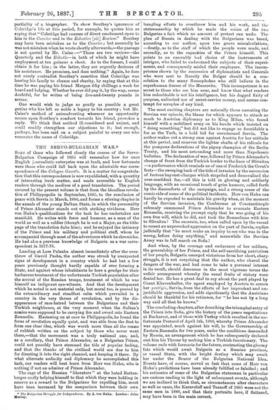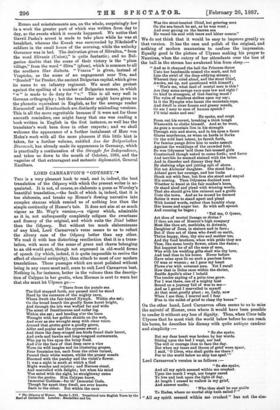THE SERVO-BULGARIAN WAR.* SOME of those who followed closely the
course of the Servo- Bulgarian Campaign of 1885 will remember how for once English journalistic enterprise was at fault, and how fortunate were those who could fall back upon the admirable war corre- spondence of the Cologne Gazette. It is a matter for congratula- tion that this correspondence is now republished, with a quantity of interesting fresh matter, and made accessible to English readers through the medium of a good translation. The period covered by the present volume is that from the bloodless revolu- tion of Philippopolis in September, 1885, to the conclusion of peace with Servia in March, 1886, and forms a stirring chapter in the annals of the young Balkan State, in which the personality of Prince Alexander stands out with striking vividness. Herr von Huha's qualifications for the task he has undertaken are manifold. He writes with force and humour, as a man of the world as well as a soldier (though he is not a Major, as the title- page of the translation dubs him); and he enjoyed the intimacy of the Prince and his military and political staff; whom he accompanied through most of the adventures which he chronicles. He had also a previous knowledge of Bulgaria as a war corre- spondent in 1877-78.
Landing at Loin Palanka almost immediately after the over- throw of Gavril Pasha, the author was struck by unexpected signs of development in a country which he had but a few years previously thought hardly capable of ever forming a State, and against whose inhabitants he bore a grudge for their barbarous treatment of the unfortunate Turkish population after the arrival of the Russian troops, treatment of which he was himself an indignant eye-witness. And that the development which he noted is not material only, but moral too, is proved by the extraordinary and steadfast calm which prevailed in a country in the very throes of revolution, and by the dis- appearance of race-hatred between the Bulgarians and their Turkish neighbours, at the very moment when the Sultan's armies were supposed to be carrying fire and sword into Eastern Ronmelia. Hastening on at once to Philippopolis, he found the focus of revolution equally quiet, and was able from the first to form one clear idea, which was worth more than all the reams of rubbish written on the subject by those who never went there,—that the movement was a truly national one, and, as a corollary, that Prince Alexander, as a Bulgarian Prince, could not possibly have stemmed the tide of popular feeling, and that the thanks of the civilised world are due to him for directing it into the right channel, and keeping it there. By what alternate audacity and diplomacy he accomplished this task, our readers will best learn from Herr von Huhn, who is nothing if not an admirer of Prince Alexander.
The rage of the Russian "liberators" at the hated Batten. berger coolly helping himself to that which they were holding in reserve as a reward to the Bulgarians for expelling him, must have been increased by the comparison between their own
• Th. Ba5,uioa Sin1991•1 for Independence. By A. von Huhn. London ; John Murray.
bungling efforts to overthrow him and his work, and the statesmanship by which he made the union of the two Balgarias a fact which no amount of protest can undo. The plan of Russia in dealing with the Bulgarians was based, Recording to our author, upon two grave miscalculations, —firstly, as to the stuff of which the people were made, and secondly, as to the capacities of the Prince himself. This points to an execrably bad choice of the instruments of intrigue, who failed to understand the subjects of their experi- ments, and consequently misled their employers. The incom- petence shown by the succession of diplomatists and Generals who were sent to Basally the Bulger should be a con- solation to the many Russophobes who still believe in the superhuman finesse of the Muscovite. This incompetence is no secret to those who see him near, and know that what renders him redoubtable is not his intelligence, but his dogged fixity of purpose, unlimited use of secret-service money, and serene con- tempt for scruples of any kind.
The most exciting chapters are naturally those narrating the Serviau war episode, the blame for which appears to attach as much to Austrian diplomacy as to King Milan, who found himself with a mobilised army on his hands which insisted on " doing something," but did not like to engage so formidable a foe as the Turk, in a bold bid for unredeemed Servia. The author makes out a strong case against Austria for her attitude at this period, and reserves the lighter shafts of his ridicule for the pompous declarations of the pigmy champion of the Berlin Treaty, and his most astounding and more than Napoleonic bulletins. The declaration of war, followed by Prince Alexander's change of front from the Turkish border to the lines of Slivnitza —a performance which reminds us of one of Frederick the Great's feats— the sweeping back of the tide of invasion by the succession of furious bayonet-charges which stupefied and demoralised the over-confident foe,—all this is told in glowing and soldierly language, with an occasional touch of grim humour, called forth by the discomforts of the campaign, and a strong sense of the comic side of some of the political incidents. Herr von Huhn can hardly be expected to maintain his gravity when, at the moment of the Servian invasion, the Conference at Constantinople solemnly summoned Prince Alexander to evacuate Eastern Ronmelia, receiving the prompt reply that he was going of his own free will, which he did, and took the Roumelians with him to Slivnitza! The suzerain, too, when called upon by the vassal to resent an unprovoked aggression on the part of Servia, replies judicially that "he must make an inquiry to see who was in the wrong, before doing anything," and meanwhile the Serviart Army was in full march on Sofia!
And when, by the courage and endurance of her soldiers, the generalship of her Prince, and the self-sacrificing patriotism of her people, Bulgaria emerged victorious from her short, sharp struggle, it is not surprising that the author, who shared the dangers of the war, and had come to take a personal interest in its result, should denounce in the most vigorous terms the unfair arrangement whereby the usual fruits of victory were denied her. He has a great deal to say about the part played by Count Kheveuhuller, the agent employed by Austria to screen her protegee, Servia, from the effects of her imprudent and un- justifiable aggression, and adds significantly that the Austrians should be thankful for his reticence, for "he has not by a long way said all that he knows."
The concluding chapters, after describing the triumphal entry of the Prince into Sofia, give the history of the peace negotiations at Bucharest, and of those with Turkey which resulted in the un- fortunate Protocol of April 5th, 1886, whereby Prince Alexander was appointed, much against his will, to the Governorship of Eastern Roumelia for five years, under the conditions demanded by Russia, an arrangement which he has subsequently declared cost him his Throne by making him a Turkish functionary. The volume ends with forecasts for the future, contrasting the gloomy fate which would await Bulgaria as a Russian province, or vassal State, with the bright destiny which may await her under the Bearer of the Bulgarian National Idea. Events have, of course, moved so fast that some of Herr von Huhn's predictions have been already fulfilled or falsified ; and. his estimates of some of the Bulgarian statesman in particular are curious reading in the light of subsequent events, although we are inclined to think that, as circumstances alter characters as well as cases, the Karaveloff and Tsanoff of 1885 were not the same men in 1886, and that their portraits here, if flattered, may have been in the main correct. Errors and misstatements are, on the whole, surprisingly few in a work the greater part of which was written from day to day, as the events which it records happened. We notice that Gavril Pasha's arrest is made to take place while he was at breakfast, whereas the Konak was surrounded by Nikolaieff's soldiers in the small hours of the morning, while the unlucky Governor was in bed. The derivation given of Slivnitza," from the word Slivanie (Union)," is quite fantastic ; and no Bul- garian doubts that the scene of their victory is the "plum village," from the word " Sliva" (plum), which is common to all the southern Slav dialects. " Vrazza " is given, instead of Vraptcha, as the scene of an engagement near Trn, and "Breslaff " for Presley, the ancient Bulgarian capital, which gives its name to an infantry regiment. We must also protest against the spelling of a number of Bulgarian names, in which " w " is made to do duty for "v." This is all very well in German orthography ; but the translator might have given us the phonetic equivalent in English, as for the average reader Karatoeloff and Krestowitsch are distinctly misleading versions. This is all the more regrettable because if it were not for these uncouth reminders, one might fancy that one was reading a book written in English in the first instance, so well has the translator's work been done in other respects ; and we shall welcome the appearance of a further instalment of Herr von Huhn's work with all the more pleasure if this little hint is taken, for a further volume, entitled A148 der Bulgarischen Sturntzeit, has already made its appearance in Germany, which is practically a continuation of the Struggle for Independence, and takes us down to the month of October, 1886, and the vagaries of that extravagant and meteoric diplomatist, General Kaalbars.



































 Previous page
Previous page